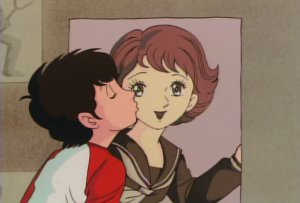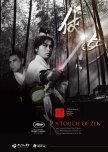
Această recenzie poate conține spoilere
‘So...if I believe in ghosts, then they exist...’
*Released in the early 1970s and regarded as the masterpiece of Hong Kong master King Hu, ‘A Touch of Zen’ had the great merit of updating a genre, the ‘classic’ wuxia, condensing within it, thanks also to its majestic but never really ‘heavy’ duration (180'), some of the most beautiful aspects of Chinese cinematography, today clearly re-proposed by contemporary filmmakers from the immense Asian territory, and by all those directors (Quentin Tarantino among the most devoted fans, for instance) faithful descendants of the great oriental film tradition.It is indeed difficult to speak of a simple adventure movie, because of the mixture of genres that runs through the picture, the repeated jumps from farcical to extremely dramatic tones, the astonishing action sequences alternating with more ‘reflective’ moments (‘definitely Zen’) make ‘A Touch of Zen’ a polyhedral work, multifaceted and therefore truly unforgettable.
Rich in symbols, allegories, even ‘arcane’ elements, always and in any case fascinating, immersed in an environmental setting rich in natural beauty, with an elegant and ingenious use of the camera and a picture capable of emphasising the contrasts, the numerous chromatic nuances (red, black and white, mainly) and alternating day/night sequences, the movie is a real feast for the eyes.
King Hu drew inspiration from a short story by the novelist Pu Songling, whose works have provided material for numerous Asian filmmakers, but it is clear that Hu, with his innovative stylistic choices, decisively marked the modernisation of the Wuxia genre, influencing generations to come (consider that the film's genesis dates back to around 1969...).
And thanks to the director's exemplary ability to synthesise, to the singularity of many sequences, even long ones, which are extremely descriptive and often dialogue-free, the observer is led almost to a kind of identification that puts him completely in the spirit of the work...
The beginning, in an almost western style (à la Leone, to be clear) immediately introduces us to one of the main characters in the story, the painter Gu; a curious observer at first, and then gradually more and more interested in the ‘strange’ pursuits that seem to enliven the sleepy town in which he carries out his occupation...It is very interesting to note how precisely the characterisation of this figure (extremely ‘modern’ in his conception of life) gradually takes on ever deeper nuances.
Also impressive is the Ghost Town (an old military fortress...) where all the characters live, which serves as the main theatre of the story: The painter in the company of his elderly mother, who continually ‘’vexes‘’ him, eager to see him settled:
‘You are 30 years old...You have to get married...get a career...I want to have grandchildren’!...
The mother-son duets willingly break the tension, bringing the film to more comic tones, even if they actually anticipate a development that is by no means banal in the evolution of the plot.
The beautiful Yang Hui-Chen, mysterious and silent, who, helped by the atmosphere of the place, is initially even mistaken by the painter for a ghost, as well as the blind peasant, whose real nature we later discover
Both figures can be considered classic, as they sum up many aspects found in numerous ‘genre’ movies, not only Chinese, but also Japanese...And if at the base of the story there is always the ‘old and healthy’ sense of revenge, it is skilfully melded with certain aspects of Zen ethics that accentuate its chivalrous nature; Precision and efficiency, discipline (which goes as far as asceticism), the noble spirit of loyalty, for example, are all at the core of the main characters' souls and determine their actions...
The Ghost Town, it was said:
During daytime, this former fortification looks like a simple assemblage of crumbling buildings, a refuge for the poor and outcast, At night, it truly appears as a place haunted by ghosts, where noises, shadows and creaks can create suspense and even fright...
Magistral from this point of view, the long sequence of the night battle, shot with an almost natural effect, where the sounds and lamentations, the screams of the fight imply a situation that will only be revealed to us at dawn, with an outcome that is both suggestive and highly dramatic...Cunning and strategy, supported by the ancestral fear of ghosts (‘Sir! the houses are haunted by spirits! ...’), against the numerical superiority of the enemy. It is evident, in this respect, how much ‘A Touch of Zen’ influenced a more recent Hong Kong classic such as “A Chinese Ghost Story”.
And over the three hours you can admire:
- Ironclad duels with jumps and evolutions that defy the laws of gravity...
- Swords with extremely strong blades that can, if necessary, act as trampolines to scale the highest walls...
- Others so flexible (yet lethal) that they can be fastened around the waist, like a belt
- A fight to the death in the middle of the forest that makes you realise how much movies like “Crouching Tiger, Hidden Dragon”, “Hero” and “House of Flying Daggers” owe to A Touch of Zen
- Bows capable of shooting numerous arrows at once
- A villainous commander-in-chief, capable of thwarting our heroes, skilled swordsmen, with only the strength of his hands
- A group of Zen monks armed only with faith (and strong ropes...), led by a master capable of taming the fiercest of enemies with a simple whisper
And so on…
So many amazing elements that constantly relaunch the story, with the aforementioned alternation of rhythm and atmosphere.
The closing, which I have no hesitation in describing as mystical, visionary, with almost psychedelic stylistic overtones, has in itself a truly majestic strength and suggestion...It may leave one doubtful, perplexed, because it does not provide a clear explanation, but there is no doubt that it is visually astounding and that, even from an iconographic point of view, it can open up to the most ‘extensive’ meanings
Majestic, sophisticated, breathtaking but also contemplative, adventurous and captivating, ‘A Touch of Zen’ is a masterpiece that leaves no one indifferent, and is therefore recommended to everyone.
10/10
--------------------------------------------------------------------------------------------------------------------------------------
*I took the liberty of reproposingt an ‘old’ review of mine that appeared many years ago on a forum that no long exists...
Considerați utilă această recenzie?
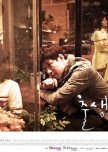
Această recenzie poate conține spoilere
Birth Mistery!?
I, sadly, found it quite poorly developed and even unresolved, e.g. the amnesia escamotage serves as an engine to move the story forward, but at the end of the day there is not even a really plausible explanation of the triggers of the memory loss, with its 'trauma' that should then activate the relative feelings of guilt, sin, redemption and all the corollary underlying the drama itself...I'm not saying certain 'motorist clichés' like “Winter Sonata”, 'I Have A Lover' or 'Stairway To Heaven', but something more determinant and concrete than 'psychogenic amnesia' yes, but...
Then let's talk about the pedagogical disaster perpetrated on the poor child, treated worse than a postal parcel!
Abandoned by the mother, then taken back with proterrity and arrogance, then almost gifted to the aunt and uncle, then taken back again by the mother, with the relative runaway and the poor father who, between a child-exchange with the companies' shares as if we were at the local fish market, because he is a poor idiot, finds himself having to tolerate all this, perhaps without even complaining...
Quite a bunch of relatives, they should all be jailed and social services called in....
The male lead character who at least improves his posture during the episodes, stopping walking like a complete idiot, something that cannot be said of the tedious father-in-law/father/grandfather (which for an Italian like me, is quite funny, because it reminds of the journalist Beppe Severgnini, A/N). It's really a pain for 18 episodes, this Rain Man/Kaiser Soze style pacing with relative hand scratching (enough!) that even makes our amnesiac Yu-ri explode, in one of the best liberating moments of the story...
...Now a digression has to be made: 'But what did the mother of the female character find so extraordinary about this phenomenon who is always bent over, mumbles two words in 18 episodes and stares at the floor or books she has read a million times that she would even have a daughter with her?
Mystery of the plot, she leaves the drama almost immediately so we will never know....
Rather than "Birth Secret/The Secret of Birth" the drama should be titled "Birth Mystery/The Mystery of Birth"
The other cult-moment is the incredible argument between the two friends-colleagues who accuse each other of stealing their boiled-fish boyfriend (who laughs out loud!) as well as the theft of the thesis (and who knows what else must have happened in the USA, eh, you naughty girls!?) ...
There is something interesting in the secondary characters, such as the youngest son of the eccentric family, with musical ambitions, as well as his mother, a fervent Catholic with a chapel in the house ('we rich people don't miss a thing, do we'!?), but also among the lead character's friends, especially the hopeless lovers who intersect their repressed desires with the lead couple, who would have deserved a little more space in the story...
The 40-year-old son's contrition for his wife comes too late... sorry but your beautiful bride is already on the plane
Awesome the CEO who goes from the board of directors to robots-transformer in two episodes, almost a record;
by the way, is it the soju drunk in buckets that ruins the brains as well as the rest, of the poor Koreans!?
The 6.5/10 is for the entertainment, even if 18 episodes are sincerely too many, and for the cast, really great overall with Yu-ri who is always fabulous and the formidable child actress a cut above the rest, even if making her cry so often is really blackmailing, anyone would be touched by a crying child (except for that monster of a mother-genius, of course!)
but it's still very difficult for me to want to see it again
Last personal note: The music in certain bridging scenes, curiously enough, has resemblance to some sound passages from 'My Love From The Star'.
Considerați utilă această recenzie?
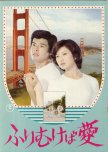
Această recenzie poate conține spoilere
You should never play with the emotions
I watched this movie with extreme curiosity, almost like entering a sort of tunnel/time machine that takes you to a space-time dimension that is truly touching for how far it is from current cinematic logic; It is undoubtedly a solid melodrama, with all the components of the case (starting with the usual dynamics and problems of social class) that finds, in my opinion, a winning choice in the superb locations of San Francisco(I had to smile remembering that even alternative musicians such as Makoto Kubota of the psychedelic band
Les Rallizes Denudes lived and played in California in the early 70s, just to say...) and in Obayashi's never banal film direction choices, which finds a capacity for synthesis, as well as some sudden directional changes
(see the 'accident' that is the cause of the meeting between the protagonist and her future husband).
Everything is undoubtedly overloaded and pushed to the extreme, the protagonist couple, extraordinarily famous at the time and also a couple in life, (I later discovered) love each other and break up in a sort of flamboyant amour-fou comings and goings with repeated plane flights ( beautifully synthesised by directorial solutions that are as simple as they are absolutely effective) or by efficient narrative re-propositions (the alternative club, but also the beginning and the end along the Golden Gate) and the story would be all here, undoubtedly not dissimilar from many others but certainly not banal, thanks to an excellent direction by a master who is never ordinary, even on a theme as simple as Take Me Away! The music is also beautiful
7,5/10
Considerați utilă această recenzie?
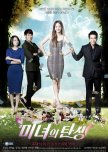
Frumusețe la Comandă
0 oamenii au considerat această recenzie utilă
Long and overcomplicate
Too, too long and exaggeratedly complicated (but why, what was the point!?) The initial cue is really excellent in addition to the criticism about a country that is at the very first places for plastic surgery, but then everything begins to crumble and disperse into heavy delays, unnecessary subplots and all those moments between the couple at home with him that keeps repeating ahjumma ahjumma (but enough!). It almost seems that they wanted to take all the possible clichés of Korean drama -the ridiculous family of him, gigantic offices where the protagonists do nothing except sit in an armchair for revenge and conspiracies, restaurants open without a why, a surgeon who doesn’t work and doesn’t even recognize his patient, just to say - and they pushed them to the paroxysm, with a sense of the ridiculous that peeps around the corner. The Count of Monte Cristo, quoted and badly served, is in itself the most glaring example of construction of melodrama - machination, revenge, shame, class relations, final twist - but, thanks God, there is really better around... Han Ye-seul is a really brilliant actress, excellent dowry for such a beautiful woman, but it must be said, here, apart from the very first episodes with the spy-story situation to hook the ex, has never been particularly valued 6,5/10 ...Considerați utilă această recenzie?

When A Man Loves A Woman
0 oamenii au considerat această recenzie utilă
Personally I struggle a bit with the temporal collocation of some events, but no big deal.
In my humble opinion, I love so much the so called " old dramas" there is certainly more courage and more melodramatic strength than the contemporaries, but I also understand that these peculiarities can leave some viewers a bit sceptical,
for what it's worth my personal rating is 8/10
Considerați utilă această recenzie?
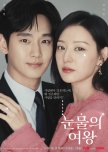
Această recenzie poate conține spoilere
The Woman Who Lived Two Times
Surrounded by a media hype worthy of the best previous series, 'Queen of Tears' certainly passes the test of success, but it doesn't reach the qualitative heights envisaged by its authors, due to a somewhat too schematic and rather predictable development, which doesn't integrate perfectly with the amount of material available, leaving us with the impression of a possible missed masterpiece...Yes, because this supremely romantic and poignant love story is supported by the usual exaggerated set of narrative stylistic traits, bordering on makjang, with which we are all familiar and which provide the necessary boost for the development and the need to keep the attention threshold high throughout the 16 long episodes; narrative stylistic traits which, however, do not seem to be able to decisively innovate the plot's contents...
The feeling is that of being faced with a very costly author's “centone” *, a patchwork of other dramas capable of advancing more by twists and disruptive emotional jolts than by a consequentiality of narrative logic.
The heart before the mind, one might say... which, let's be clear, is a beautiful way of developing a truly redundant story, of sublime love and certainly moving (prepare your handkerchiefs because it is very emotional...), at least for me, an incurable romantic, but which fails to dare to use a more innovative language, not even experimental, but perhaps less mechanical and accommodating, made more to please the audience, who are evidently already well predisposed...
Personally, and this is not a very good sign, I found myself, quite surprisingly, mentally anticipating several plot twists which then punctually occurred, such as:
- The Hong family's hurried escape, with their arrival in the village of Yongdu-ri, which introduces a great narrative twist for one of my favourite moments of the drama, with very funny situations almost in the style of "Family Outing"
- The press conference with Hae-in's confession, absolutely inevitable at that point in the story
- The predictable and dare I say "announced" sequence with the encounter at the traffic lights and the related “traffic accident”.
Here and there one has the suspicion of a fabricated cult classic, perhaps capable of repeating the enthusiastic success of "Crash Landing On You" (even mentioned in a fleeting appearance in a scene on the TV) without, however, having the same narrative force as its predecessor, which, unlike "Queen of Tears", is capable of escaping a schematic manicheism bordering on sketchiness, and can also count on a decidedly more interesting backstory... It is precisely in the pursuit of a familiar, self-indulgent and quite quotable scheme that 'Queen of Tears' reveals perhaps the least convincing side of its construction, as well as in some not entirely successful acting passages...
The pattern is quite common in the portrayal of the Hong family, with rather classic family characters and dynamics, accompanied, however, by some very good performances, especially by the always excellent Na Young Hee and, of course, Lee Mi Sook who, with those beady eyes, makes us realise immediately where this is going...
The Baek family, with the usual array of villagers to temper the narrative tension, is just the right amount of fun, although I didn't find the group of friends from the hairdresser's salon particularly entertaining.
Even the "company" part in the department store doesn't exactly shine with originality, with the usual set of classic assistants/employees, but a special mention for Yoon Bo Mi who is really cute and funny; Hyun Woo's group of friends/lawyers is of a good standard, capable of giving us some funny moments (the advice on divorce!), as well as the inevitable decisive actions to help our hero.
In the brilliant performance of a stunning Kim Ji Won we must recognise the true strength of the drama, with a staggering characterisation, of great artistic maturation, capable of penetrating into the essence of the scenes, alternating moments of frenzy, often irresistibly comic, with others of pure emotion where the simple facial expressions communicate more than a thousand words, for what is truly the perfect interpretation of a woman who lived two times; while it is perhaps in Kim Soo Hyun's work that one remains a little less convinced, finding almost a sort of mechanicity, bordering on self-citationism for example of her extraordinary role in that masterpiece that is "My Love From The Star", (certainly more than in the equally marvellous work done in "Its OK") including the monologue in front of the camera;
Let's be clear, we are talking about one of the best actors in the drama world and not only, but here he seems to play it safe, without pushing the pedal of style in a fully convincing way... However, it must be specified that the chemistry between the two main characters is very much present, especially in the levity episodes where there is often an amused and funny air as in certain old-school screwball comedies (see for example the jealousy scenes, often relying more on looks than words)
As for Park Sung Hoon, I often tell myself that when a character in the story comes to be particularly well hated, it means that his performer has done his job perfectly, and he has; he is an excellent villain, admittedly not particularly original, but the dramatic crescendo is certainly adequate and effective.
Pure gold the cameo of our lawyer Song Joong Ki/Vincenzo Cassano, a real hilarious one as always (Vincenzo! We miss you!), but also the appearance of the unlikely trio of 'Hong Gil-dong Detective Agency' ex-cartoonists, straight from 'My Love From The Star' almost made me cry ('My Love' also quoted with the pen-recorder element...)
The choice of locations is absolutely stunning, starting with Potsdam and the beautiful Sanssouci Palace which, we can bet, will soon see an exponential increase in its tourist flow; it must be said that given the use of specific car brands, a joint venture with Germany seems obvious. There is no need to repeat that Korean landscapes are always extraordinary, thanks also to a dreamlike photographic setting, of great impact, able to glorify sequences such as, for example, the moment of the proposal at sunset with the related ring, pure magic!
The nocturnal pre-finale on the snow-covered landscape is impressive, reminding me of certain asian noir movies of the 1960s (the closing of Truffaut's 'La Sirene du Mississippi' also came to mind), but absolutely stunning and extraordinarily moving the epilogue, truly an unforgettable example of film poem; in that beautiful epigraph there is the whole sense of the tale.
At the end of the voyage, a bit like in a theatre performance, some of the characters wonder what they have witnessed, mentioning different cinematographic genres... I wondered about this myself, reflecting on whether the structure and unfolding of the story could really have been adapted to the most classic of Sageuk, for example... One of the best film noirs of the 1950s, Fritz Lang's 'The Big Heat', would undoubtedly have been a beautiful western, just as Samuel Fuller's '40 Guns' could have been a great female-driven gangster-movie (thanks to the magnificent Barbara Stanwick)...
Heart and mind always at odds make me say that yes, it's true, "Queen Of Tears" is a drama that is not completely focused, quite conventional, with many narrative clichés, several contradictions and the usual unlikely things, perhaps with an eye towards the international and western television markets, but bearing in mind that suspension of disbelief has always been a basic element in following and loving dramas, it is important to be guided by the heart and to be overwhelmed by the extraordinary romanticism of the story, which makes me give it a positive rating of 8/10, probably reviewable on a second view...
*I preferred to keep the term Centone in Italian because it is quite hard to translate; let's say that -helping us with the Internet- a centone is a text composed of a collage of quotes from different authors or operas, joined together to form an original composition. It is often used in a somewhat disrespectful way in the film industry, while from my side it is a simplification to indicate a work full of multiple quotations, references etc....
Considerați utilă această recenzie?
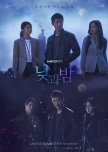
Această recenzie poate conține spoilere
For lovers of genre
I watched "Awaken" based on VIKI's introduction, expecting a crime thriller maybe in the style of "Flower of Evil" or "The Devil", two series I really adoredAt the beginning, I followed with good expectations, thanks to a rather impressive incipit and with intriguing subsequent suggestions, even though the typifications of the main characters were not particularly original (the usual typecasting of the variegated team at work always reminds me of certain Japanese robot cartoons of childhood with the leader, the beauty, the clumsy and the nerd, those things, in short...).
However, as the episodes went on, I began to have more than one doubt about the direction of the series with a growing sense of annoyance, a red alert for a scenario completely different from the initial perspective; getting to the point, the expansion to Sci-Fi and things of this nature I had not really planned for and at that point the interest really dropped exponentially...
I mean, it's not that the story is particularly boring, it's reasonably elaborate and repeatedly tries to revive the attention with impactful cliffhangers, but the problem is that 'Awaken' really does come at a very late stage and smashes open doors from so many previous ones...
With everything we ‘ve had, from 'The X-Files' to 'Stranger Things', via 'Dark Angel' and their many epigones with 'special kids', it's a moment's notice to find yourself in such trite situations that you're able to understand much of the unfolding almost immediately.
The usual secret labs, the usual child-guinea-pigs, the usual mad doctors, between Dr. Frankenstein and the many crazed demiurges in a delirium of omnipotence, perhaps even parents of the aforementioned lab subjects
In overall terms, for fans of the same genre, it is certainly something that can intrigue and involve, but at the same time, for the aficionado with a little knowledge of the material, it is impossible not to notice the incredible accumulation of references, clichés and tired stereotypes that make the nose twitch, as well as the usual holes in the logic that often screw up the elaboration and development of many situations...
And it's a pity, because in my opinion the moral dimension of the story should have been highlighted more, thanks to the excellent performance of the main character Namkoong Min, capable of casting for several episodes the classic shadow of doubt on his true nature; it's also a shame for the little in-depth analysis between our super-child and the really disturbing mad scientist-mother, limited to the last episodes; the same goes for the police-daughter/father-scientist relationship, with an always excellent Kim Chang Wan in a role that would have deserved a better deepening, but then the police daughter (who we are told is also of great merit) really knows practically nothing about her father's work, for all those years! ?
The lead character in the guise of a wanted possible multiple homicide who calmly drives around the city, in defiance of roadblocks, checkpoints, camera recordings or phone interceptions (as seen in so many dramas or movies) is inexcusable, as is the Terminator-turn with the relative moving of trucks with his hands (but why?), with sudden and opportune super-powers...
A comic anthology is the three days wasted by Jamie (by the way, she, Lee Chung Ah, really beautiful -nda) and the nosey reporter waiting for the rain to cease so they can go by boat to the island-laboratory, and then the two 'super-boys' who come and go in a flash, at night, and how do they do it, maybe flying!?
It gets to the end rather tiredly due to the too many twists and turns of the drama with a pretty predictable and practically inevitable ending that leaves that inevitable sense of déjà-vu and general discontent quite marked...
Personally my rating is 7/10, fairly generous, more for the first part of the story and for some of the acting performances:
Of course Namkoong Min who certainly doesn't need me to tell him that (he's a class actor!) and something in the minor characterisations but at the end of the whole affair there are no particular desires left for second viewings...
Considerați utilă această recenzie?
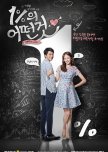
Something About 1 Percent
0 oamenii au considerat această recenzie utilă
Această recenzie poate conține spoilere
A walk in a Summer Evening
Always beautiful and exciting, this gem of a romance that has not lost its lustre over time, I find it refreshing and pleasant, like certain late summer evenings of yesteryear (nowadays perhaps with the climate warming it is a bit more difficult...)It may be due to the relatively short duration of the episodes, to the flowing of the situations without lengthy or overly complicated situations, but it is certainly in the extraordinary chemistry of the couple that the key to its innumerable merits is to be found (from a male perspective, it is impossible not to love a creature like Jeon So-Min.).
The minimalism often achieves the best possible result without overdoing it, but with that emotional crescendo that is demanded of a romantic comedy in which everything flows in the right way, even the silences and meditative pauses. But there is one aspect that I would like to highlight, and that is the great sensuality that pervades the whole drama. It is hard to believe that the classic 'spark' has never been ignited between the couple, thanks also to the very warm effusions exchanged, a far distant from certain cold kisses in other similar productions... Perhaps the last episode claims to settle every last detail, or various couple concatenations, but it is just a trifle, and it remains an 8.5/10 drama recommended to everyone
Considerați utilă această recenzie?

